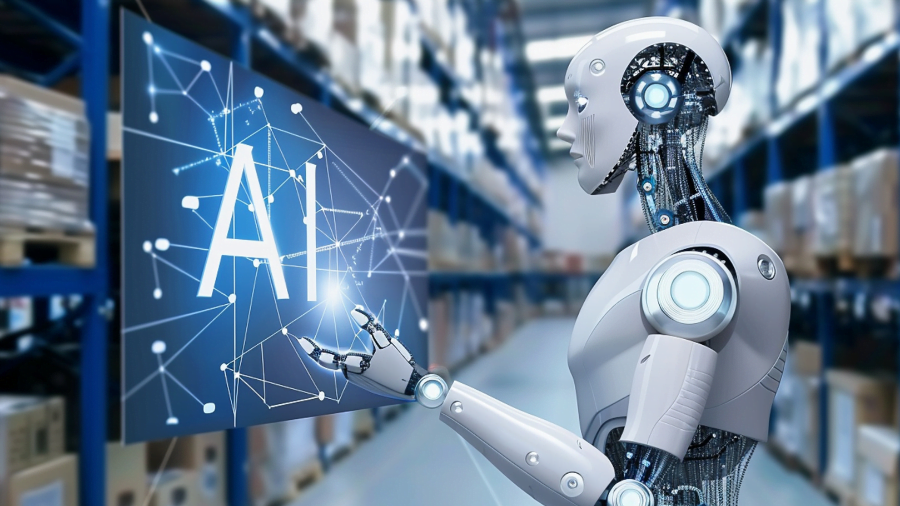Epicor's AI Expansion and Green Initiative: A Detailed Analysis
Epicor, a global provider of industry-specific enterprise software, recently announced a series of advancements in its AI capabilities and a new sustainability initiative at its Epicor Insights 2025 user conference. The announcements include enhancements to Epicor Prism, a network of vertical AI agents, and the introduction of Carbon Cost Rollup, a patent-pending offering designed to help businesses pursue sustainability goals without sacrificing profitability. This article delves into the details of these announcements, their potential impact, and the broader context of AI and sustainability in the manufacturing and supply chain sectors.
AI Advancements: Epicor Prism and Grow AI
Epicor has been steadily integrating AI into its ERP solutions, and the latest announcements build upon this trend. The general availability of enhancements to Epicor Prism and the introduction of new predictive machine learning (ML) capabilities in Grow AI mark significant steps forward.
Epicor Prism: Vertical AI Agents for Supply Chain
Epicor Prism is designed as a network of vertical AI agents tailored for specific supply chain industries. These agents are intended to address the unique challenges and opportunities within each industry, providing targeted insights and automation. The enhancements to Prism focus on improving its ability to:
- Fast-track employee onboarding: AI agents assist in quickly training new employees by providing relevant information and guidance.
- Streamline information retrieval: AI-powered search and retrieval tools make it easier for employees to find the information they need.
- Enhance decision-making: Rapid visual analysis of charts, metrics, orders, and lists helps decision-makers quickly identify trends and patterns.
According to Epicor, these AI agents can collaborate to suggest parts, suppliers, costs, and delivery schedules, cutting down communication time by up to 40%. This level of integration and automation can significantly improve efficiency and reduce operational costs.
Grow AI: Predictive Modeling Engine
Grow AI is Epicor's predictive AI modeling engine, running on the Grow Data Platform. It provides businesses with the ability to:
- Forecast demand: Predict future demand based on historical data and market trends.
- Optimize inventory levels: Determine the optimal amount of inventory to hold, reducing carrying costs and minimizing stockouts.
- Improve production planning: Optimize production schedules to meet demand while minimizing waste and maximizing efficiency.
The new predictive ML capabilities in Grow AI are designed to enhance the accuracy and reliability of these forecasts, enabling businesses to make more informed decisions. By leveraging machine learning, Grow AI can adapt to changing market conditions and continuously improve its predictions over time.
Carbon Cost Rollup: A Sustainability Initiative
Perhaps the most intriguing announcement from Epicor Insights 2025 is the introduction of Carbon Cost Rollup, a patent-pending offering that aims to help businesses track and report their carbon emissions. This initiative reflects a growing awareness of the importance of sustainability and ESG (Environmental, Social, and Governance) factors in the business world.
Treating Emissions as Currency
Carbon Cost Rollup establishes 'Cost Rollup' methods from standard costing systems, adapting this concept to transform carbon tracking by treating CO2 emissions as a currency. This approach allows business leaders to calculate their compliance reporting with a high degree of certainty.
The key benefits of Carbon Cost Rollup include:
- Simplified carbon calculations: Complex carbon calculations are greatly simplified, making it easier for businesses to understand their environmental impact.
- Seamless integration: The feature integrates seamlessly with existing carbon footprint calculation APIs, streamlining the process of attaining sustainability and ESG reporting goals.
- Accurate reporting: Helps businesses accurately measure and report on Scope 1, 2, and 3 emissions, ensuring compliance with environmental regulations.
Understanding Scope 1, 2, and 3 Emissions
To fully appreciate the significance of Carbon Cost Rollup, it's essential to understand the different scopes of carbon emissions:
- Scope 1 Emissions: Direct emissions from owned or controlled sources. This includes emissions from company-owned vehicles, manufacturing facilities, and on-site power generation.
- Scope 2 Emissions: Indirect emissions from the generation of purchased electricity, heat, or steam. This includes emissions from the power plants that supply electricity to a company's facilities.
- Scope 3 Emissions: All other indirect emissions that occur in a company's value chain. This includes emissions from suppliers, transportation, and the use of products by customers.
Tracking and reporting on all three scopes of emissions is crucial for a comprehensive understanding of a company's environmental impact. Carbon Cost Rollup aims to provide businesses with the tools they need to accurately measure and report on these emissions, enabling them to make informed decisions about reducing their carbon footprint.
Industry Analyst Perspective
Yaz Palanichamy, senior advisory analyst at Info-Tech Research Group, offered valuable insights into the potential impact of Carbon Cost Rollup. He noted that the tool aims to treat emissions like currency, which is a welcome step in the right direction from a sustainability tracking perspective.
Palanichamy emphasized the timeliness of such a tool, given the current industry environment where many global organizations in the manufacturing and supply chain sector are aiming to reduce their carbon emissions and improve their ESG reporting practices. He also highlighted the ease with which complex carbon calculations can be simplified using Carbon Cost Rollup.
Political and Regulatory Considerations
While Carbon Cost Rollup offers significant benefits for businesses looking to improve their sustainability efforts, its deployment in the U.S. may face challenges due to the current political climate. Palanichamy raised concerns about the absence of stringent federal mandates and guidelines and how this might impact the adoption of such a tool.
The relationship between American political rhetoric and its influence on governing the usage of carbon tracking solutions cannot be undermined. It is advised to assess the current political climate in the U.S. and understand how the political and regulatory framework will affect the ongoing discourse surrounding climate change disclosures and ESG reporting policies.
Understanding these factors is crucial for large enterprise vendors like Epicor to navigate the potential fallout from any stringent guardrails brought forth by political mandates and to ascertain any undue political influence affecting Carbon Cost Rollup.
The Future of AI and Sustainability in ERP
Epicor's latest announcements reflect a broader trend in the ERP industry: the increasing integration of AI and sustainability into core business processes. As businesses face growing pressure to reduce costs, improve efficiency, and minimize their environmental impact, ERP systems are evolving to meet these needs.
AI-Powered ERP: Enhancing Efficiency and Decision-Making
AI is transforming ERP systems in several key ways:
- Automation: AI-powered automation can streamline repetitive tasks, freeing up employees to focus on more strategic activities.
- Predictive analytics: AI can analyze vast amounts of data to identify trends and patterns, enabling businesses to make more informed decisions.
- Personalization: AI can personalize the user experience, providing employees with the information and tools they need to be productive.
- Chatbots and virtual assistants: AI-powered chatbots and virtual assistants can provide employees with instant access to information and support.
By leveraging AI, ERP systems can become more intelligent, adaptive, and user-friendly, helping businesses to improve their overall performance.
Sustainability-Focused ERP: Tracking and Reducing Environmental Impact
Sustainability is becoming an increasingly important consideration for businesses, and ERP systems are playing a key role in helping them to track and reduce their environmental impact. Sustainability-focused ERP features include:
- Carbon accounting: Tracking and reporting on carbon emissions across the value chain.
- Energy management: Monitoring and optimizing energy consumption.
- Waste management: Tracking and reducing waste generation.
- Supply chain sustainability: Assessing and improving the environmental performance of suppliers.
By integrating sustainability into ERP systems, businesses can gain a comprehensive view of their environmental impact and identify opportunities for improvement.
Conclusion
Epicor's latest announcements at Insights 2025 underscore the growing importance of AI and sustainability in the ERP industry. The enhancements to Epicor Prism and Grow AI promise to improve efficiency and decision-making, while Carbon Cost Rollup offers a valuable tool for businesses looking to track and reduce their carbon emissions.
While the future of Carbon Cost Rollup in the U.S. remains uncertain due to the evolving political landscape, the initiative reflects a broader trend towards greater environmental responsibility in the business world. As businesses face increasing pressure to reduce their environmental impact, ERP systems will continue to play a critical role in helping them to achieve their sustainability goals.















